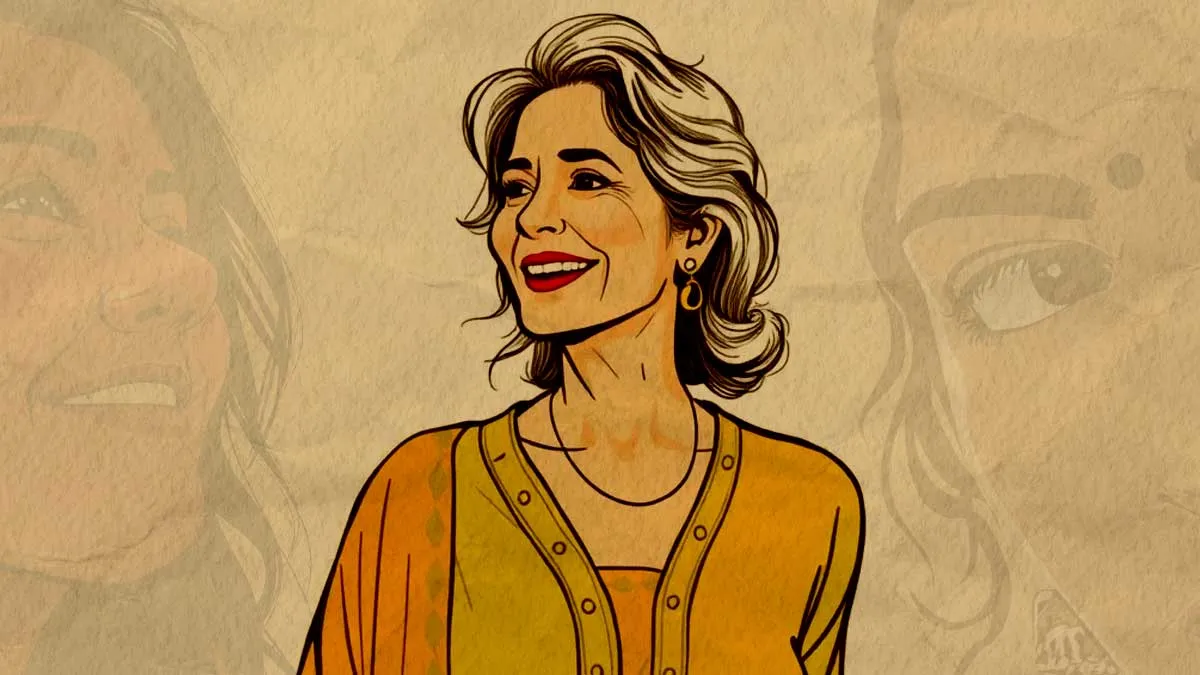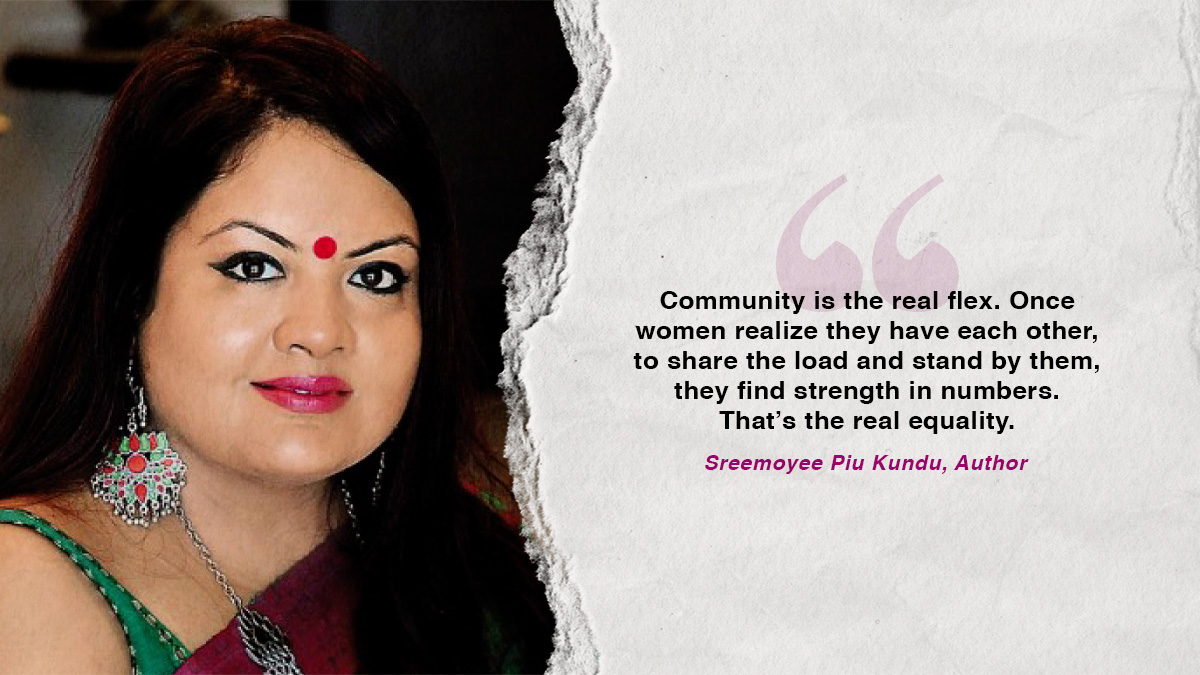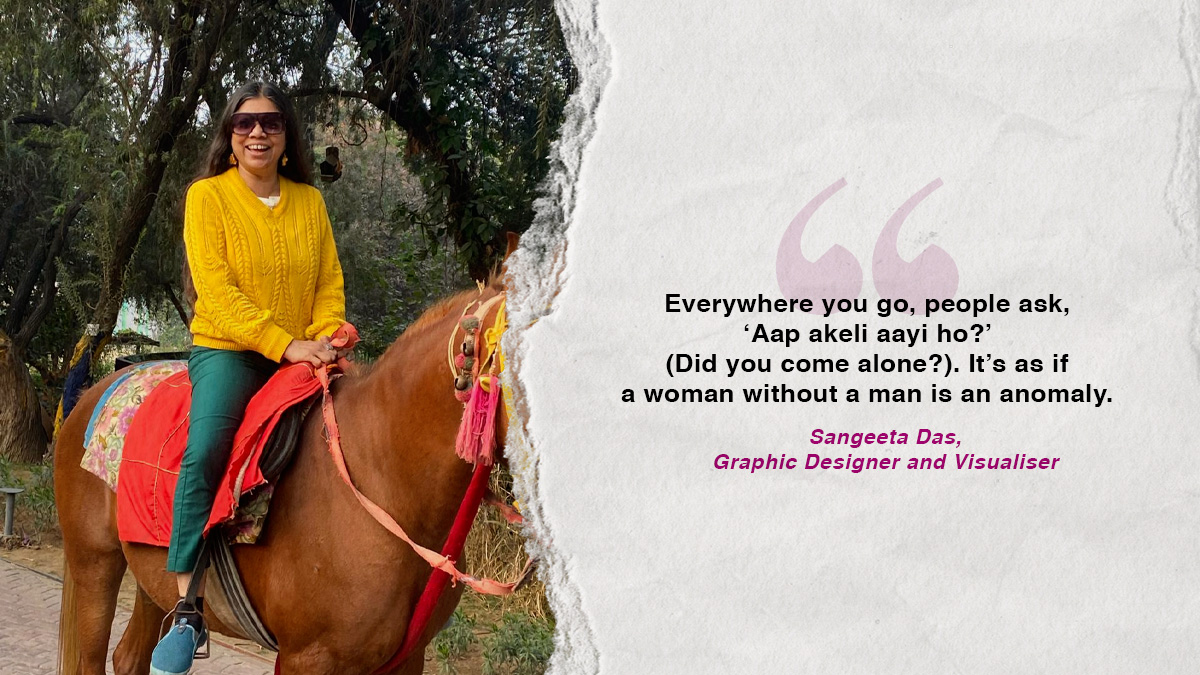
For centuries, marriage was at the centre of women’s lives. Messaging and conditioning from all quarters made them believe that becoming wives, mothers, and caretakers of households was something they should aspire to do. Those who remained single—whether by choice, divorce, or widowhood—continue to be met with sympathy, suspicion, or even social exclusion. But times are changing.
According to the census data, in 2011, India had 71.4 million single women, making up 12% of the country’s female population. The data shows a 39% increase from 2001.
Women today, are shaking off old shackles, to choose independence on their own terms. They are redefining what singlehood can look like – one that isn’t defined by a lonely, sad life, as has been portrayed or passed down by generations in Indian society. Financial independence, education, and changing aspirations have empowered many to reject outdated norms and dictates.
Read: Aamir Khan and the Price of Personal Choices in the Public Eye
Yet, challenges remain. From social stigma and housing discrimination to a lack of legal protections and institutional support, single women continue to navigate a world built around traditional family structures.
HerZindagi spoke to women from different quarters of life, and age brackets to understand how life pans out as single women in India.
For many women, their decision to remain single is deeply rooted in their upbringing and seeing strong, independent women in their childhood. Sangeeta Das, a 53-year-old graphic designer, recalls how her grandmother’s way of life shaped her worldview. "I was the firstborn in my family, and my parents were always very particular about focusing on my career," she says. "I watched my grandmother, who was widowed at 24 during Partition, raise two children while working. My mother, though a housewife, had a deep desire to work and earn her own living. That influenced me greatly."
Sangeeta, from ages 18 to 30, spent 10 years focusing on her career, relishing her singlehood and her independence. "I travelled, explored, trekked, and did things I knew I wouldn’t have been able to do if I had married early," she says.
But at 30-31, she began considering marriage. "All my friends were married with children, and I thought maybe now was the right time." It took her five years to find a partner, and at 35, she tied the knot. However, a major difference in future plans—her desire to have children and his reluctance—led to their separation after five years of marriage.-1742470643830.jpg)
Sreemoyee Piu Kundu, a 47-year-old journalist turned author, has always been open and vocal about her life. Born into a middle-class Bengali family, she lost her father to suicide when she was just 2.5 years old. Her mother, a young widow, faced social isolation and financial hardship but eventually remarried—a man 13 years younger than her. “The agency she offered herself was something I found incredible,” she said.
One of the key struggles single women battle every day is discrimination on the grounds of their singlehood.
Pallabi Chatterjee, a 38-year-old journalist and single mother, recounts how landlords repeatedly turned her away because of her status.
"I faced sexist and uninvited comments like, ‘We cannot rent out a flat to a single woman with a daughter… don’t know what kind of guests (read: men) you’d be having over!’ and ‘Where’s your husband? How will you manage your kid alone?’,” she recalled hearing.
Sangeeta echoed her thoughts, adding that simple tasks like opening a bank account or buying a car come with invasive questioning. "Everywhere you go, people ask, ‘Aap akeli aayi ho?’ (Did you come alone?). It’s as if a woman without a man is an anomaly.”
The judgment extends beyond landlords and vendors, to society at large.
Shreemoyee highlighted that this lack of acceptance is not just social but institutional. "There is no real government support for single women—no health benefits, no tax breaks, and barely any pension support. Finding a house to rent is difficult, and just existing in society means dealing with invasive scrutiny about your personal life," she added.-1742470655951.jpg)
Verbal attacks and gossip follow single women around—from intrusive questions about their morality to unwarranted speculation about their personal lives. “Scathing remarks from my parents, relatives, and acquaintances still continue. Very direct taunts about me sleeping around have been spoken in front of my kid,” Pallabi shares.
She added, that unwarranted stereotyping, especially of the sexual kind is also commonplace. "Unnecessary and unwelcome sexual innuendos and explicit statements are commonplace. MILF is a label men tend to put on you, irrespective of what you want.”
Read: From Rent-a-Boyfriend to Kink Events: How India is Embracing Alternative Intimacy
Pallabi doesn’t shy away from sharing, that being single, she does feel the pangs of loneliness at times. “The absence of a companion gets to you many times," Pallabi admits. "Loneliness feels like an unbearable hell, but you have no one to share your woes with. Family will blame you, and friends may not fully understand."
Not being invited to different spaces, in the same way as before, was also something Sangeeta experienced, as friends around her got married, had children and raised families. “People did exclude me from gatherings, weddings, or parties. Couples would go on vacations, but not invite me. I had to condition myself to believe that being single is my choice, so I’ll have to make peace with these things,” she said.
Even though loneliness can be overwhelming, Pallabi believes that over time, it becomes manageable. "One day, everything comes under your control. You just have to face the storm, all the time.”
Sangeeta pointed out that the only time singlehood really hit her was when she worked abroad. “In the UK, the work culture was very different—there wasn’t the same warmth from colleagues as in India. That’s when I truly felt alone and realized I had to learn to manage singlehood on my own."
Shreemoyee stretched upon the fact that the biggest misconception is that a single life will be unbearable. "People ask, ‘Who will take care of you when you’re old? Who will wait outside the OT for you?’ There’s this deep-seated belief that a woman cannot exist alone,” she said.
The women unanimously highlighted that financial independence has been the aspect that fuelled a change in mindsets.
Sreemoyee explained how she’s witnessed multiple accounts of women being able to choose for their selves, due to their sound financial footing. “I have seen women walking out of marriages, and also choosing to not settle down by a certain age. I also see women prioritising financial independence, and their own emotional and physical wellbeing, over chasing a man. The real game changer is financial independence and higher education,” she said.
However, most women lack financial knowledge, added Sangeeta. "Women need financial guidance," Sangeeta says. "We don't understand taxation, stocks, mutual funds, and bonds. This knowledge gap makes single life harder."
Shreemoyee is the founder of Status Single, India’s largest community for single women. She started this initiative in 2018 after publishing her book of the same name, based on interviews with 3,500 single women across the country.
"During the pandemic, our Facebook group of 5,000 women became a virtual support system," she shared. "We had weekly calls where hundreds of women, even from the South Asian diaspora, joined in. In 2021, we had our first in-person meeting."
This growing solidarity is crucial because, as Shreemoyee points out, single women face a unique set of struggles, that vary depending on their circumstances. "There’s so much diversity in this community—transwomen, widows with children, disabled women, and divorced women. Many of my friends are divorced."
Shreemoyee’s biggest takeaway after interacting with many single women through this community, she said was, “Women are lonely—even married women. Community is the real flex. Once women realize they have each other, to share the load and stand by them, they find strength in numbers. That’s the real equality."
Sangeeta, quoted in this story, is also part of the Status Single community.
Giving a simple example, Sangeeta highlights how single life can often be quite stress-free. She said, “I want to have noodles tonight, so I can just make noodles and eat it. If I had a husband or family to look after, I’d have to think of so many factors before deciding between cooking noodles – will my partner like it? Will he eat just noodles or should there be another dish with it? Now, I get to make decisions without any inhibitions.”
A popular reel trend, showing single women thriving, highlights how they go on trips around the world, move cities and live their lives on their own terms – as they’re husband and child-free.
View this post on Instagram
Sangeeta added that singlehood requires constant self-reliance. "You have to keep swimming. You have to be alert and watchful. By the time I was 45-50, I got accustomed to dealing with people’s questions and societal expectations.
For Pallabi, life as a single mother is far from easy, but she urges people to stop assuming that marriage is the only path to fulfilment. "Singlehood can be fulfilling, but it’s not one-size-fits-all. Everyone’s journey is different. The real issue is that people need to stop forcing marriage onto women. Emotional manipulation never pays well in the end.”
A growing sense of community and self-reliance is helping dismantle the age-old narrative of singlehood as a fate to be pitied—reframing it instead as a powerful choice. Being single now, is no longer a compromise but a full life, being led on one’s own terms.
Also watch this video
Herzindagi video
Our aim is to provide accurate, safe and expert verified information through our articles and social media handles. The remedies, advice and tips mentioned here are for general information only. Please consult your expert before trying any kind of health, beauty, life hacks or astrology related tips. For any feedback or complaint, contact us at [email protected].